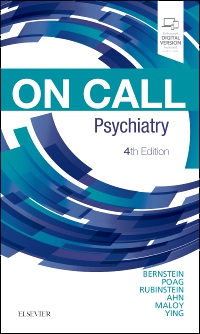
On Call Psychiatry, 4th Edition
Paperback

-
- Highlights medications, doses, and critical information in a second color for fast reference.
- Features a logical, highly templated format so you can locate key information quickly.
- Delivers consistent, easy-to-follow coverage of the most common on-call problems and approaches, including what to do from the initial phone call, questions you should ask to assess the urgency of each situation, "Elevator Thoughts," how to immediately identify major threats to life, what to do at the bedside, and how to avoid common mistakes for every call.
-
- Provides updated content and references, keeping you on the cutting edge of current, evidence-based information.
- NEW! Expert Consult™ eBook version included with purchase. This enhanced eBook experience allows you to search all of the text, figures, and references from the book on a variety of devices.
-
Bernstein et al.: On Call Psychiatry, 4th edition
1. Approach to Emergency Psychiatric Evaluation
2. The Role of the Psychiatric Consultant
3. Psychodynamic Issues
4. Telephone Consultation
5. Seclusion and Restraint
6. Assessment of Capacity and Other Legal Issues
7. The Difficult Patient
8. Emergency Evaluation of Children and Adolescents
9. The Agitated Patient
10. The Anxious Patient
11. The Violent Patient
12. The Suicidal Patient
13. The Psychotic Patient
14. The Confused Patient
15. Movement Disorder
16. Barriers to Communication: Mutism , etc.
17. Physical and Sexual Trauma
18. The Pregnant Patient
19. Intoxication
20. Substance Withdrawal
21. Insomnia
22. Headache
23. Chest Pain
24. Nausea and Vomiting
25. Fever
26. Seizures
27. Falls
28. Blood Pressure Changes
29. Telepsychiatry
30. Cross Cultural Issues
Appendix

 as described in our
as described in our 